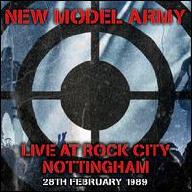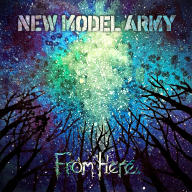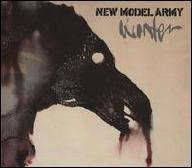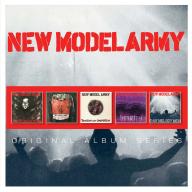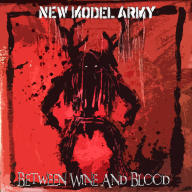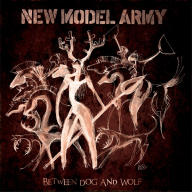New Model Army were formed in the Yorkshire town of Bradford in 1980. In keeping with the band's intellectual bent, their name was taken from Oliver Cromwell's anti-royalist military force, whose hierarchy was based on ability rather than social class, and which temporarily succeeded in toppling the monarchy in the mid-1600s. Early on, guitarist/vocalist/bandleader Justin Sullivan adopted the nom de punk "Slade the Leveller," which despite its aggressive ring was an esoteric reference to the Levellers, a radical democratic faction of Cromwell associates. The concept for New Model Army grew out of a meeting between Sullivan and writer Joolz Denby, who went on to become a respected poet, novelist, and spoken word artist in her own right; the two also became lifelong romantic partners. Bassist Stuart Morrow was the first to sign on, and after a rotating succession of drummers, Rob Heaton became a permanent member, as well as Sullivan's frequent songwriting partner. Denby, for her part, served as the band's manager early on, and while the job ultimately proved too time-consuming, she continued to design the band's cover art and occasionally provided backing vocals in the studio; the band also backed her on several albums of her own, credited simply to Joolz.
New Model Army spent a couple of years gigging around Yorkshire and building a substantial buzz in the British music press. In 1983, the group issued its debut single, "Bittersweet," which landed them a deal with the indie label Abstract by the end of the year. Their first release for Abstract was the politically charged "Great Expectations" single, which reached the British indie singles charts and set the stage for their debut album, 1984's Vengeance. Songs like the antiwar "Spirit of the Falklands," the frustrated "Small Town England," and the militant title track further defined NMA's perspective. In its wake, the non-LP single "The Price" was a smash on the indie charts, and major-label EMI stepped in to sign the band.
New Model Army's first single for EMI, "No Rest," climbed into the British Top 30 in early 1985, marking the first of the band's 12 pop chart entries. It was followed in short order by the album No Rest for the Wicked; however, bassist Stuart Morrow left the band that May, prior to the LP's release. Sullivan and Heaton cut the mostly acoustic Better Than Them EP before finding a permanent replacement in 17-year-old Jason Moose Harris. Following the non-LP single "Brave New World," Harris made his album debut on 1986's Glyn Johns-produced The Ghost of Cain, which expanded the group's acoustic folk influence and featured contributions from harmonica player Mark Feltham. The single "51st State," a critique of Britain's relationship with the United States, was a hit in Europe, and a dance remix of "Poison Street" was successful in the U.K.; additionally, album-opener "The Hunt" was later covered by Brazilian metal band Sepultura.
"White Coats," a track from a self-titled 1987 EP, became NMA's biggest hit in some time, adding keyboards to their sound. Guitarist Ricky Warwick briefly joined their touring lineup that year before moving on to found the Almighty. Produced in part by Tom Dowd, NMA's next album, 1989's Thunder and Consolation, was widely acclaimed as their best ever, with an even stronger folk influence thanks to the presence of violinist Ed Alleyne-Johnson. The single "Green and Grey" was also tabbed as a highlight of the band's career, and both "Stupid Questions" and "Vagabonds" charted in the U.K. Chris McLaughlin joined as a second guitarist for the supporting tour, but bassist Harris later departed and was replaced by Peter Nelson, formerly of Brotherhood of Lizards. Nelson debuted on 1990's Impurity, which also featured new second guitarist Adrian Portas.
After one more album, the 1991 double-live set Raw Melody Men, NMA left EMI to sign with Epic. They released only one album, 1993's The Love of Hopeless Causes, which spawned the single "Here Comes the War." Several CD compilations of the group's singles, as well as B-sides, radio sessions, and other rarities appeared during the early-'90s reissue boom. The band, though, fell mostly silent during the middle of the decade. In the meantime, Sullivan and Joolz formed a four-person performance collective dubbed Red Sky Coven, which offered an informal mish-mash of music, poetry, comedy, and spoken word. Sullivan reconvened New Model Army in 1998, still with a core of Nelson and Heaton, and with a supporting membership of guitarists/keyboardists Dave Blomberg and Dean White. This lineup, augmented by strings and brass, recorded Strange Brotherhood for the U.K. label Eagle. Its supporting European tour produced another live album, the double-disc ... Nobody Else, released by Attack Attack. That label also issued the studio follow-up, Eight, in 2000; it marked the group's first album without longtime drummer Heaton, who was replaced by Michael Dean. The odds 'n' ends collection Lost Songs appeared in 2001, and a Sullivan solo album (Navigating by the Stars) in 2003.
Sad news came in 2004 with the death of Heaton, but as New Model Army turned 25 they continued to soldier on. The studio album Carnival appeared from Attack Attack in August 2005; it featured Sullivan, Dean, Nelson, Blomberg, and White. High was released from this lineup in 2007, with Today Is a Good Day landing in 2009. After recording a series of albums they felt sounded traditional and like a "band in a room," the group decided to try something more polished. As a result, they recorded their 2013 effort, Between Dog and Wolf, with engineer Joe Barresi (Queens of the Stone Age, Tool) mixing. After their BDAW world tour, the band used live recordings as well as six new tracks for a follow-up mini-album titled Between Wine Blood, released in September 2014. The group returned in 2016 with their 14th record, Winter. Touring the album throughout 2017 across Europe and the U.K. and playing select dates in 2018, Sullivan and co. returned to the studio the following year to start work on what would be their 15th studio album. Recorded at the remote Ocean Sound Recording Studio on the Norwegian island of Giske, Ear Music issued From Here toward the end of 2019, preceded by the rousing single "End of Days." ~ Steve Huey, Rovi


